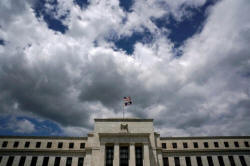|
Central bankers want
communication, not coordination
 Send a link to a friend
Send a link to a friend
 [July 03, 2017]
By Balazs Koranyi [July 03, 2017]
By Balazs Koranyi
FRANKFURT (Reuters) - There is no
behind-the-scenes pact between powerful central bankers to tighten
policy but the potent effect their actions have on financial markets
means they want a deeper understanding of each others' motivations,
officials told Reuters.
European Central Bank President Mario Draghi renewed his long-standing
wish last week for more talks between global central banks, fuelling
suspicions that policymakers discussed more at recent gatherings than
they admit.
Indeed, the ECB, the Bank of England, the Bank of Canada and Norway's
central bank all turned unexpectedly hawkish in just a matter of days
with Sweden and the Reserve Bank of Australia expected to follow suit
this week.
Coming on the heels of the Bank for International Settlement's annual
meeting in Switzerland, where top officials are well shielded from the
media, traders and analysts have looked suspiciously at the turn of
events.

However, policymakers on both sides of the Atlantic said they often
share their economic views in private but to foster understanding and
not to coordinate policy as each central bank acts independently.
Banks need to fulfill different mandates with widely different tools and
any hint that domestic policy is subjugated to the interest of foreign
central banks risks a public relations disaster. This makes policy
coordination, let alone cooperation, practically impossible, sources
said.
"Can you imagine Draghi coming to the Governing Council, or just the
board saying: thanks for coming but I've already agreed with Yellen," a
source at a euro zone central bank said. "How quickly would that leak?"
While central banks make their own decisions, these still have far
reaching consequences for currency, bond and derivatives prices.
Therefore policy transparency, the key benefit of private meetings,
prepares policymakers for what may be coming, limiting market
volatility.
"The more we can talk to each other and also communicate to markets in a
way that doesn't increase uncertainty, that would be very helpful,"
Draghi said last week in Sintra, Portugal, at another gathering of
central bankers. "So the need is there, how to do it is not simple."
Some market players seized on that as a new openness by Draghi to
coordinate policy with other central banks.
Indeed, such cooperation is not unknown.

In late 2008, as the global financial crisis was spiraling out of
control, banks, including the U.S. Federal Reserve, the ECB and the
Swiss National Bank, cut rates in a coordinated move. In 2011, a
concerted effort by G7 central banks helped stabilize the Japanese yen
after a devastating earthquake.
[to top of second column] |

Flags fly over the Federal Reserve Headquarters on a windy day in
Washington, U.S., May 26, 2017. REUTERS/Kevin Lamarque

In fact, Draghi's remarks in Sintra only echo a call he made a year ago for more
dialogue to limit the market volatility related to the varying pace of the
recovery across major economies.
PICKING UP SPEED
A source familiar with the Fed's thinking also poured cold water on the idea of
a pact. Given heightened scrutiny from Congress, any suggestion that the central
bank subjugates policy to secret deals with overseas banks would seriously
damage the institution's standing, the source added.
"We can't reveal any information that is not already in the public domain so we
explain our thinking, share our analysis, but can't discuss our next step," the
source said.
Private meetings are often more technical and more detailed given that they are
made to an expert audience and they allow for frank discussion that may not be
appropriate in public, the sources added.
"But I've never heard Yellen or Carney discuss anything that has not already
been said in one form or another before," said a European official, who has
attended such closed door meetings in the past.
Yet the shift in the banks' tone is no coincidence, the officials say.
The recovery is picking up speed and seems to be solidifying, a conclusion made
in various financial centers. And taking a more upbeat stance in public becomes
easier when others are also changing their tone, as the risk of a market
volatility diminishes, the sources said.

But the differences between how central banks operate are also huge. The Fed has
to reconcile an inflation and employment mandate while the ECB needs to worry
about a discordant currency union that came to the brink of collapse in recent
years.
And while the Bank of Japan is also seeing some progress, policymakers are keen
to say that they are far from tightening policy.
"I'm 99 percent sure that no such pact has been agreed – but there is indeed
broad common agreement that the world (ex-UK) is looking a whole lot better than
they thought just six months ago," UniCredit economist Erik Nielsen said.
"And in such an environment, it is not surprising that central banks are looking
to modify their policies," he added.
(Editing by Toby Chopra)
[© 2017 Thomson Reuters. All rights
reserved.] Copyright 2017 Reuters. All rights reserved. This material may not be published,
broadcast, rewritten or redistributed. |